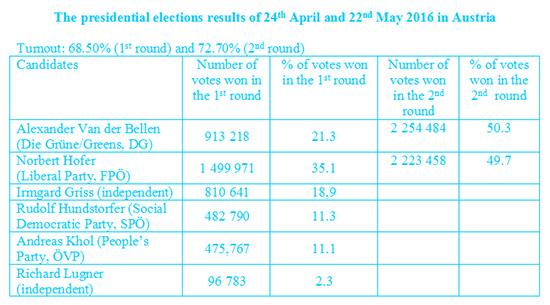Results
Elections in Europe
Corinne Deloy
-

Available versions :
EN

Corinne Deloy
Former spokesperson for the ecologist party (1997-2008), Alexander Van der Bellen (Die Grüne - DG) finally won the 2nd round of the presidential election in Austria on 23rd May after a tense 24 h wait. He won 50.3% of the vote against 49.7% for Norbert Hofer (FPÖ), who drew ahead in the 1st round on 24th April (35.1% of the vote against 21.3% for Alexander Van der Bellen).
On 22nd May, Norbert Hofer had won 51.9% of the vote and had 144,006 votes more than his ecologist rival. Therefore the remaining 885,437 postal votes still had to be sorted, representing no less than 14% of the electorate. The latter who had chosen to vote by post gave 61% of their votes to the ecologist candidate and therefore tilted the presidential election in support of Alexander Van der Bellen.
Even for the FPÖ, undoubtedly one of the most powerful populist movements in Europe, it remains difficult to date to win an election that is governed by the majority vote.
Turnout totalled 72.70% i.e. + 4.2 points more than in the 1st round on 24th April.
 Source : http://wahl16.bmi.gv.at
Source : http://wahl16.bmi.gv.at
The leap made by civil society
Alexander Van der Bellen benefited then from the Republican front mounted by civil society, which does not exist within the Austrian political classes. Between 2000 and 2007 the People's Party (ÖVP) and the FPÖ governed together, the SPÖ and the FPÖ did the same between 1983 and 1986. .
According to a poll by the daily Die Presse 40% of Alexander Van der Bellen's voters supported him in effect to form a block against Norbert Hofer. After reminding his fellow countrymen that the "folly of nationalism" had caused Austria's ruin, the ecologist candidate declared, "I hope that all of my supporters will vote and also those who don't like me that much but think that I would make a better President of the Republic than my rival."
The replacement of Chancellor Werner Faymann (SPÖ by Christian Kern (SPÖ) on 17th May last undoubtedly helped Alexander Van der Bellen.
"The mobilisation of the abstentionists will decide the outcome," indicated Christoph Hofinger, an analyst for the pollster SORA on 24th April. According to an exit poll by SORA the abstentionists in the 1st round were effectively decisive in the victory of the ecologist candidate. 200,000 of the 330,000 people who did not vote on 24th April voted for Van der Bellen on 22nd May. The latter also benefited from the transfer of votes over from independent candidate Imgard Griss, former judge at the Supreme Court, and from SPÖ. Finally the SORA poll showed that most men voted for Norbert Hofer whilst a majority of women chose Alexander Van der Bellen. The latter also took most of the votes of those living in towns and the most qualified.
Defeat shaped like victory
In spite of his defeat, this presidential election is a source of satisfaction for the FPÖ which won the best score in its history to date. Norbert Hofer came out ahead of his rival in 6 of the 9 Länder that make up Austria.
Austria seems to be more divided than ever before with half of the electorate prepared to give their vote to a populist party. The FPÖ has taken advantage of hostility against the establishment, and more widely of the malaise expressed by a majority of Austrians who wonder what the future holds for them and their children, about their place in the world and who foresee that tomorrow their lives will be more difficult than today. "Whoever the winner is, this election is already the greatest victory for the FPÖ nationally since one voters in two voted for him," stressed Reinhard Heinisch, political expert from the University of Salzburg.
Heinz-Christian Strache's accession to the Chancellery after the next general elections planned for in 2018 seems now no longer impossible. "This electoral campaign was an investment for the future", said Norbert Hofer quite rightly.
The new president of the Republic
Aged 72, Alexander Van der Bellen was born in Vienna. Graduate in economy from the University of Innsbruck, he was an assistant at the Finance Institute of the same university and then at the International Institute for Management and Administration in Berlin. In 1976 he became professor at the University of Innsbruck, then at the Federal Academy for Administration of Vienna and at the University of Vienna, where he was appointed Dean of the Faculty of Economic and Social Sciences.
Firstly a member of the SPÖ, Alexander Van der Bellen joined the Greens (DG). He was elected MP in 1994 and became his party's spokesperson in 1997, a post he held until 2008.
Alexander Van der Bellen, the second ecologist head of State in the EU with Latvian Raimonds Vejonis (Union of Greens and Farmers, ZZS), will take office on 8th July next.
On the same theme
To go further
Elections in Europe
Corinne Deloy
—
25 February 2025
Elections in Europe
Corinne Deloy
—
18 February 2025
Elections in Europe
Corinne Deloy
—
28 January 2025
Elections in Europe
Corinne Deloy
—
14 January 2025

The Letter
Schuman
European news of the week
Unique in its genre, with its 200,000 subscribers and its editions in 6 languages (French, English, German, Spanish, Polish and Ukrainian), it has brought to you, for 15 years, a summary of European news, more needed now than ever
Versions :



